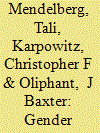|
|
|
Sort Order |
|
|
|
Items / Page
|
|
|
|
|
|
|
| Srl | Item |
| 1 |
ID:
131520


|
|
|
|
|
| Publication |
2014.
|
| Summary/Abstract |
When and why do women gain from increased descriptive representation in deliberating bodies? Using a large randomized experiment, and linking individual-level speech with assessments of speaker authority, we find that decision rules interact with the number of women in the group to shape the conversation dynamics and deliberative authority, an important form of influence. With majority rule and few women, women experience a negative balance of interruptions when speaking, and these women then lose influence in their own eyes and in others'. But when the group is assigned to unanimous rule, or when women are many, women experience a positive balance of interruptions, mitigating the deleterious effect of small numbers. Men do not experience this pattern. We draw implications for a type of representation that we call authoritative representation, and for democratic deliberation.
|
|
|
|
|
|
|
|
|
|
|
|
|
|
|
|
| 2 |
ID:
178059


|
|
|
|
|
| Summary/Abstract |
If we look at a rendering of planet Earth from a bird’s eye view, we see a very familiar sight - satellites orbiting the planet like electrons, each one a testament to humanity’s expansion beyond Earth’s atmosphere. This familiar sight, nevertheless, begs the question: what is this new landscape? This paper looks at the production of outer space through a historical case study of Topex/Poseidon and its successors, internationally collaborative satellites designed primarily to measure the global circulation and topography of the Earth’s oceans. Tracing the history of these satellites, we open up a black box of entangled interests and enacted power that illuminates some of the ways in which Earthspace and outer space are co-produced. It leads us to encounter a global collaboration to collect oceanographic data (WOCE), the establishment of a new scientific discipline, Earth System Science, the fabrication of data infrastructure, as well as algorithms and exclusive computers, all which shed light upon the construction of outer space and the geopolitics of outer space that lie therein.
|
|
|
|
|
|
|
|
|
|
|
|
|
|
|
|
| 3 |
ID:
131504


|
|
|
|
|
| Publication |
2014.
|
| Summary/Abstract |
This paper introduces a rational choice model for multiple kinds of participation to empirically investigate several theoretical determinants of social capital (SC) formation. The framework is rich enough to investigate the importance of individual variables, social/peer effects, endogenous trust, political-institutional, and inequality factors as sources of participation. We show that the aforementioned contextual factors explain SC formation for Chile, but their relative importance varies for each kind of participation. Our second application compares individual-level determinants of SC formation among the largest democracies in the Americas. Gender, age, education, and race show heterogeneous effects across countries. Overall, negative interpersonal trust shocks generate participation increments, and possibly motivate engagement in trustworthy networks. Idiosyncratic factors behind participation and trust are positively correlated, suggesting a common SC stem that manifests in multiple ways. Hence, our empirical approach to SC formation uncovers factors hidden by assumptions in some previous literature.
|
|
|
|
|
|
|
|
|
|
|
|
|
|
|
|
|
|
|
|
|